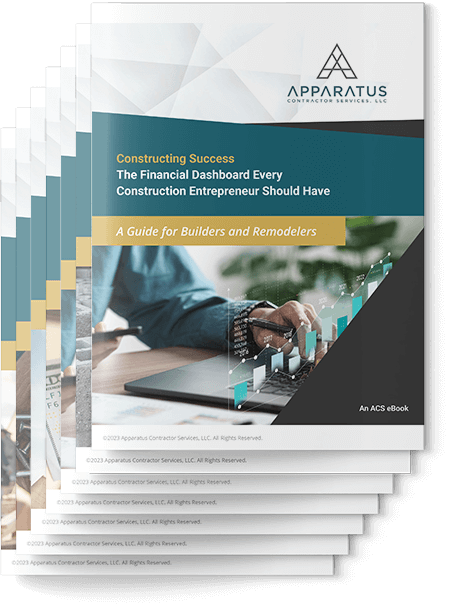Maintaining the strength of your construction financials begins and ends with understanding the key metrics that underpin your construction company’s performance. Knowing what to monitor is crucial to making informed decisions, identifying areas for improvement, and ensuring long-term success. In this blog post, we’ll explore the essential metrics you should be tracking to maintain a healthy financial picture and drive growth.
Gross Profit Margin
Gross profit margin is a measure of your company’s profitability, calculated by subtracting the cost of goods sold (COGS) from revenue and dividing the result by revenue. This metric provides insight into your company’s ability to generate profit from its core operations. A higher gross profit margin indicates that your construction business is more efficient at converting revenue into profit.
Net Profit Margin
Net profit margin is another crucial profitability metric. It is calculated by dividing net income by total revenue. Net profit margin accounts for all expenses, including operating costs, taxes, and interest. A higher net profit margin indicates that your construction business is effectively managing its expenses and generating profit.
Current Ratio
The current ratio is a measure of your company’s liquidity, calculated by dividing current assets by current liabilities. This metric helps you determine whether your construction business can meet its short-term financial obligations. A current ratio of at least 1 is generally considered healthy, while a ratio below 1 may indicate potential cash flow issues.
Debt-to-Equity Ratio
The debt-to-equity ratio is a measure of your company’s financial leverage, calculated by dividing total liabilities by total equity. This metric indicates the proportion of debt used to finance your construction business’s assets. A higher debt-to-equity ratio may indicate increased risk, as it suggests that your company relies more on borrowed funds to finance operations.
Return on Assets (ROA)
Return on assets is a measure of your company’s efficiency, calculated by dividing net income by total assets. This metric provides insight into how effectively your construction business is using its assets to generate profit. A higher ROA indicates that your company is more efficient at converting its assets into earnings.
Work-in-Progress (WIP) Schedule
A work-in-progress (WIP) schedule is a crucial financial tool for construction businesses, as it provides an overview of all active projects and their financial status. A WIP schedule can help you monitor project progress, identify potential issues, and ensure that revenue and expenses are accurately recognized. Regularly updating and reviewing your WIP schedule can provide valuable insight into your construction business’s performance.
Overhead Rate
The overhead rate is a measure of your company’s indirect costs, calculated by dividing total overhead expenses by total revenue. This metric provides insight into your construction business’s efficiency in managing indirect costs, such as rent, utilities, and administrative expenses. A lower overhead rate indicates that your company is more efficient at managing its indirect costs.
Backlog
The backlog is a measure of your construction business’s future workload, calculated by summing the total value of all signed contracts that have not yet been completed. A healthy backlog indicates a strong pipeline of future work, which can help provide stability and predictability for your company’s revenue and cash flow.
In conclusion, understanding and monitoring these key financial metrics is crucial for the success of your construction business. By keeping a close eye on these indicators, you can identify areas for improvement, make informed decisions, and ensure the long-term financial health of your company. Remember that staying proactive in your financial management can ultimately contribute to your construction business’s growth and profitability.
GET THE PROFESSIONAL BOOKKEEPING HELP YOU NEED
Apparatus Contractor Services, LLC provides affordable bookkeeping, payroll, and CFO services exclusively to construction-industry businesses. Let us give you the precision bookkeeping foundation you need to grow a remarkably profitable construction business. LEARN MORE









